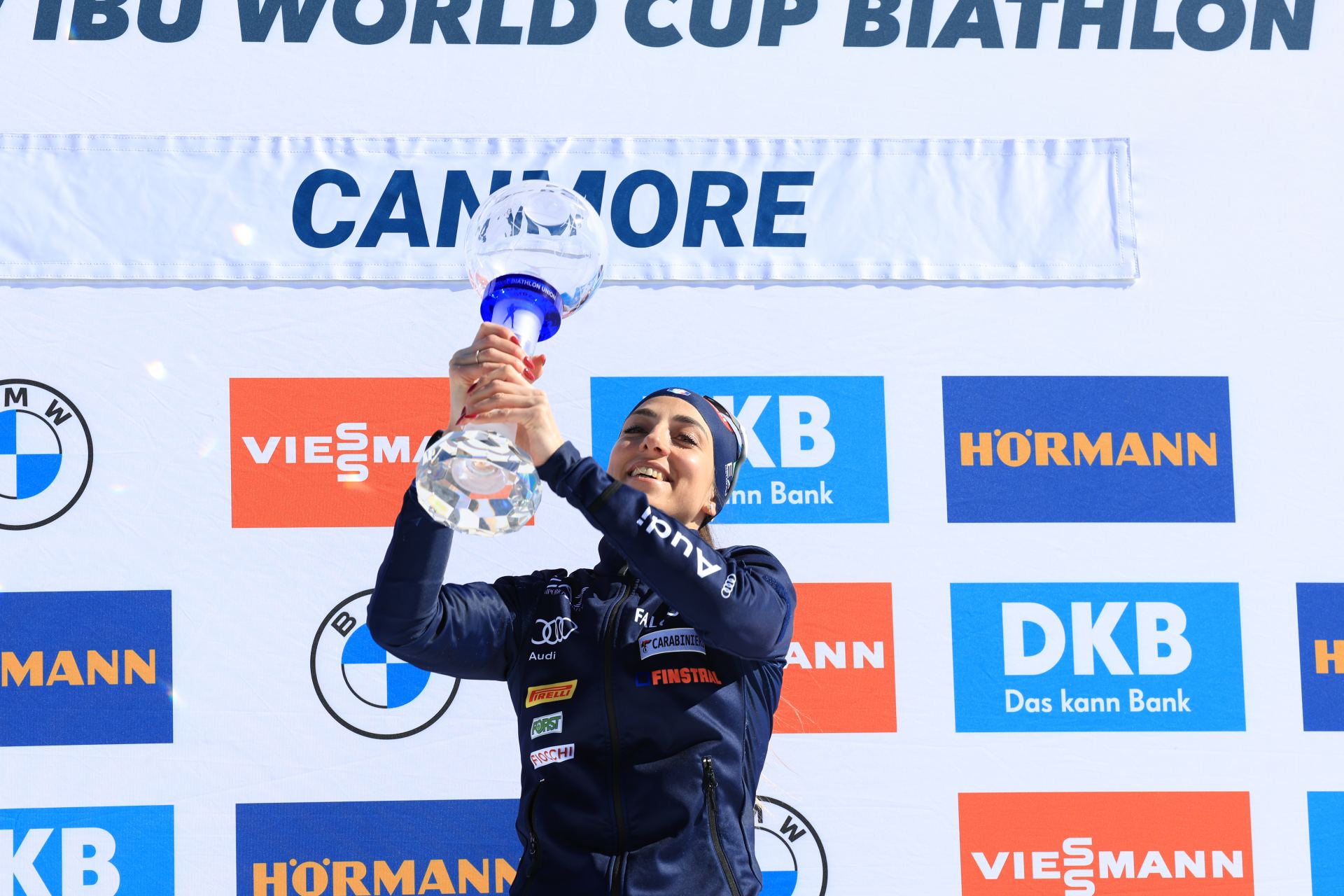7 Key Stats: A Look Back at the 2023/24 Season
Curious about how many times the Boe brothers shared the podium? Who holds the title of the first World Cup winner born in the 21st century? When was the last time there were six different Women's World Cup standings leaders during one season? Those are just some of the questions we looked at.
Johannes with 20 WCH gold medals
Ole Einar Bjoerndalen earned the illustrious title "king of biathlon" through his remarkable feats at the World Championships. Between 1994 and 2017, he secured an impressive 20 gold medals. This incredible record was matched by Johannes Thingnes Boe, who, in Nove Mesto, added victories in the pursuit, individual, and mass start events to his 17 championship titles. The distinction of being the most successful biathlete in the World Championships' history remains with Bjoerndalen, who boasts 14 silver medals compared to "only" 13 from his successor. The next opportunity for Johannes to further enhance his achievements will be in March 2025 in Lenzerheide. He also made his mark in competitions at the World Cup level this winter. His exceptional sprint in Canmore resulted in a remarkable lead of 1:02.7 over the nearest competitor. This marked the fifth time anyone had won a sprint with a lead of over a minute. Previously, Ole Einar Bjoerndalen achieved this feat three times (Nagano '98, Hochfilzen '01, Holmenkollen '04), but the record was held by Raphael Poiree, who in March 2004 triumphed over Michael Greis with a margin of 1:01.8. It took two decades for this record to be surpassed.
Tarjei’s second youth
What do Tarjei Boe and a fine wine have in common? They improve with age. This comparison holds up, especially considering his resurgence this winter at the age of 35. While he secured victory only once, he graced the podium nine more times. Following the competitions in Hochfilzen, he wore the yellow bib - a feat last achieved in January 2012. This return to World Cup leader position after a 4,354-day hiatus stands as an unprecedented event in history.
Boedium statistics
For quite some time now, it has been widely acknowledged that the Boe brothers reign as the most accomplished siblings in biathlon's history. However, the 2023/24 season added an entirely new chapter to this remarkable tale. Throughout this winter, Johannes and Tarjei graced the podium together in six separate races. Since the sprint event at the WCH in Kontiolahti back in 2015, this phenomenon has occurred 24 times, with Tarjei only getting the better of his brother twice: first in December 2020 during the sprint in Kontiolahti, then four months later in the pursuit race in Nové Mesto.
Perrot, the first 21st-century-born WC winner
Achieving success in biathlon at a young age is no easy feat, making those who manage it all the more commendable. Eric Perrot earned his place among these exceptional individuals with his victory in the sprint at Soldier Hollow, becoming the first World Cup competition winner born in the 21st century (among women, the latest born WC winner is Elvira Oeberg - class '99). Additionally, Perrot made history as the youngest winner of a World Cup race since 2013, when Johannes Boe's immense talent first made its mark on the sport.
Frenchwomen dominance
For every devoted biathlon fan familiar with the discipline's history, names like Anne Briand, Emmanuelle Claret, and Corinne Niogret are etched in memory. In the mid-1990s, they formed one of the strongest teams, securing the Nations Cup three times. Nearly three decades passed before French biathletes could match the successes of their predecessors on a similar scale. Lou Jeanmonnot, Justine Braisaz-Bouchet, and Julia Simon shone this season, winning a remarkable 14 out of 25 races. The pinnacle of French women's dominance came at the sprint event during the WCH in Nove Mesto, where they swept the top four places, a feat last achieved by the Soviet Union biathletes in the inaugural 1984 championships.
Six different WC women leaders
The battle for the Crystal Globe in the 2023/24 women's season unfolded like a thrilling rollercoaster ride. Ultimately, Lisa Vittozzi found herself leading the pack. However, this doesn't mean she didn't face stiff competition along the way. Franziska Preuss, Karoline Knotten, Lou Jeanmonnot, Ingrid Landmark Tandrevold, and Justine Braisaz-Bouchet all took turns as World Cup leaders. A total of six different names led the standings - a scenario reminiscent of the 2008/09 season, which saw the victory of Helena Ekholm. Despite being 15 years apart, both cases are similar: the Italian and the Swede wore the yellow bib only twice - once after the season's first competition and again in the final race, after letting others take the lead in between.
Vittozzi’s precise shooting
Lisa Vittozzi's key advantage in her quest for a first-ever crystal globe proved her impeccable shooting efficiency. Throughout non-team races, the Italian maintained an impressive 94% accuracy - a feat unmatched by any previous winner of the overall World Cup title (a record previously held by Gabriela Soukalova with 92.8% in the 2015/16 season). Vittozzi achieved a perfect shooting score in an impressive number of 10 races, surpassing the record set by Helena Ekholm 15 years ago, who got nine zeros on her way to the World Cup title win. Vittozzi's sprint performances were particularly noteworthy, scoring 79 out of 80 shots.
